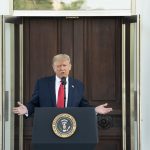The first presidential debate featuring former President Donald Trump and Vice President Kamala Harris has come and gone, leaving behind a mixture of triumph and turmoil that is all too familiar in the political sphere. In a showcase meant to shed light on contrasting visions for America, what viewers witnessed was less a contest of ideas and more a theatrical performance where even the so-called moderators appeared to be on Team Harris. The bias of ABC’s David Muir and Linsey Davis was more transparent than a glass house in broad daylight, demonstrating just how far the legacy media will go to prop up Democrat candidates. This wasn’t just a debate; it was a masterclass in media manipulation.
Trump handled himself with the poise and experience of a seasoned politician, addressing a three-on-one scenario where he was not only up against Harris but also the glaring partisanship of the moderators. Time and again, he struck back against Harris’s fabrications, particularly when she attempted to link him to “Project 2025,” a vague initiative that he disavowed without hesitation. Trump’s acumen on economic issues shone brightly in a space where he historically excels, engaging the audience and leaning into his expertise on the matter. Given that he enjoys strong favorability ratings on economic management, his performance in this arena was not only expected but well-executed.
The First Trump/Harris Debate: the Good, the Bad and the Uglyhttps://t.co/6heg1ksDFX
— RedState (@RedState) September 11, 2024
As the debate commenced, Harris’s nerves were palpable. She seemed flustered, often stumbling on her words and exuding an air of uncertainty. Post-break, however, she attempted to regain her footing, but that effort was largely unconvincing. Among the more memorable moments was Trump’s clever jab referencing one of Harris’s past statements, showcasing his quick wit while challenging her credibility. Yet, while Trump exhibited a knack for redirecting questions toward key Republican talking points, Harris managed to evade providing substantive answers, relying instead on vague platitudes and non-answers that left viewers hungry for clarity.
Harris’s inability to articulate her economic vision was glaring. She delivered what could only be described as “word salad,” devoid of specifics or actionable data. Her characterization of Trump’s economic policies as benefiting the wealthy went unanswered in terms of her own plan. Meanwhile, the moderators failed to hold her accountable for her lack of specifics or offer probing questions to unpack her grand pronouncements of an “opportunity economy.” Instead, they allowed her to rattle off talking points while ignoring the glaring absence of a coherent strategy.
The most striking disappointment of the night came from the moderators themselves. Their open bias was a blatant display of the divide that exists in political discourse today. Many have pointed out this embarrassing moderation; one could hardly imagine a world where such partisanship goes unchecked. Of course, it raises a valid question: when will members of the GOP demand a truly neutral playing ground for debates? With the Harris campaign now seeking another opportunity to debate, it could be a sign of misplaced confidence or perhaps a recognition that she left much to be desired in this encounter. To achieve fairness, the Trump campaign must advocate for a debate format that levels the playing field and allows real discourse to flourish.
As the election season heats up, the conversations surrounding the first debate will echo in the minds of voters. Trump, while gracious in handling the situation, must leverage this experience into a call for greater integrity in the debate process. What is certain is that as the country heads deeper into this election cycle, Americans are eager for truth and clarity in leadership—something largely missing in the current political landscape.




